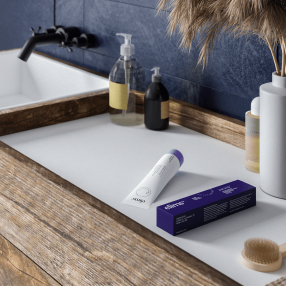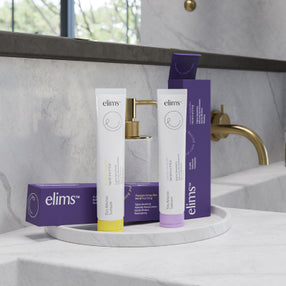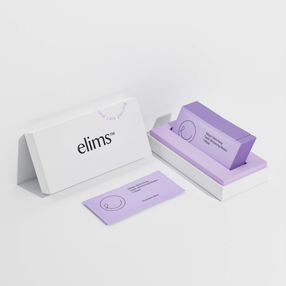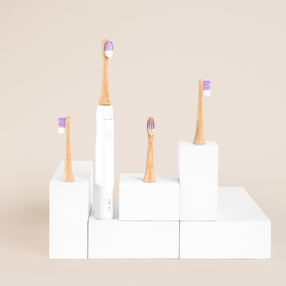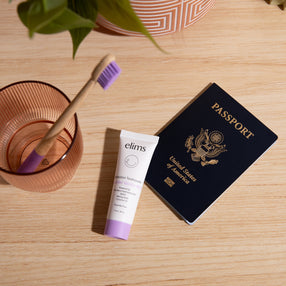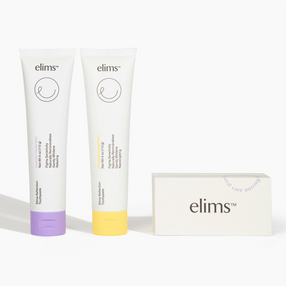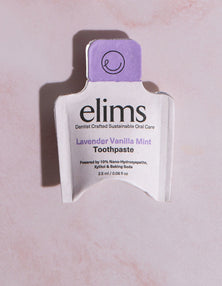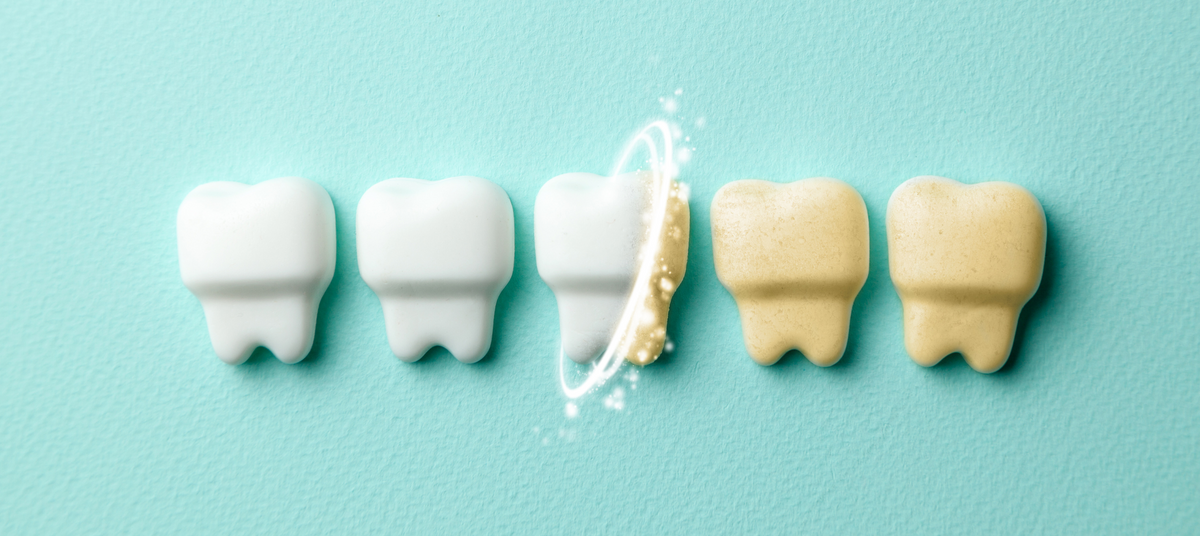
Should I whiten my teeth at home or at the dentist office?
Should I whiten my teeth at home or at the dentist office?
When it comes to achieving a brighter smile, one question that often comes up is whether to whiten your teeth at home or opt for professional teeth whitening at a dental office. This decision can significantly impact the outcome of your teeth whitening journey.
We asked Dr. Michael Yang, DDS, an expert in preventive and cosmetic dentistry at Perfect Smile Dental Group to dive into the pros and cons of both options and help you make a more confident choice.
Understanding the Basics of Teeth Whitening
Before diving into the decision-making process, it's essential to understand what teeth whitening involves. At its core, it's the process of removing stains, plaque, and tartar from your teeth, restoring their natural whiteness. Teeth whitening can be done in two main ways: at home or by a dentist.
Let's break down the options.
Teeth Whitening at Home
Many people opt for at-home teeth whitening options due to convenience and cost-effectiveness. When it comes to teeth whitening, there are only two active ingredients that have been clinically proven to whiten teeth, whether at home or at the dentist's office: hydrogen peroxide and carbamide peroxide. Many at-home treatments may claim that they whiten teeth “naturally” but without either hydrogen peroxide and carbamide peroxide, they are unlikely to work, so be sure to check the ingredients panel for effectiveness.
Whitening at home can come in many forms, and here are some common ones:
1. Toothpaste: The most fundamental approach to teeth whitening is brushing your teeth regularly with a quality toothbrush and toothpaste. Look for toothpaste with whitening agents, such as nano-hydroxyapatite, coconut oil, baking soda, or hydrogen peroxide for added whitening. Note, avoid using charcoal toothpaste, as it will damage your precious enamel.
2. Whitening Strips: Over-the-counter whitening strips are a popular choice because they're easy to use, can be used virtually anywhere, have no mess, and can gradually whiten your teeth over a few days. We love ELIMS Melt-Away Teeth Whitening Masks for their easy dissolving technology and virtually no tooth sensitivity.
3. Whitening Trays & Gels: Fitted whitening trays, available at drugstores, allow you to apply a whitening gel to your teeth. The trays may come with a light that may help you see results faster. These trays can be effective but require consistency, are often messy, and can cause sensitivity to both teeth and gums.
Teeth Whitening at the Dentist's Office
Professional teeth whitening at a dentist's office offers a more comprehensive approach with less time involved. Dental offices can use a variety of methods to whiten teeth in-office that use two main active ingredients for teeth whitening: hydrogen peroxide and carbamide peroxide with various concentrations to cater to the patient’s needs.
These ingredients are often applied to teeth in the form of a gel with typically two methods:
+ A high-concentration hydrogen peroxide gel, applied by a syringe, or
+ Hydrogen peroxide gel combined with a high-intensity light, like LED, UV or halogen. The light is applied by a lamp or laser device that sits directly outside of your mouth, where light can help whiten teeth faster than hydrogen peroxide alone.
Here's what else you can expect from a professional whitening visit:
1. Professional Evaluation: Dentists assess your dental health and determine which teeth whitening is appropriate for you.
2. Customized Treatment: Dentists use professional-grade whitening agents and tailor the treatment to your specific needs, ensuring safety and efficacy.
3. Immediate Results: Unlike at-home methods, professional teeth whitening can yield noticeable results after just one visit.
The Pros and Cons of At-Home Teeth Whitening
Pros:
+ Cost: At-home options are generally more budget-friendly than professional treatments, usually in the range of $25-$75 for a full treatment (compared to professional teeth whitening in the range of $200-$500).
+ Convenience: You can perform at-home teeth whitening at your own pace anywhere you like and without the need for appointments.
+ Gradual Whitening: For those who prefer a subtle change or are concerned about sensitivity, at-home methods provide a slower, more gradual approach.
+ Avoiding Tooth Sensitivity: Because these treatments are done over several days, at-home treatments can cause less tooth sensitivity allowing time for your teeth to recover between treatments.
Cons:
+ Limited Results: At-home methods may not achieve the same level of whitening as professional treatments.+ Speed of Treatment: It may take several days to see results.
+ Safety Concerns: Misuse of at-home products can lead to tooth sensitivity or damage to gums and enamel.
+ Requires Consistency: Achieving results with at-home methods requires strict adherence to the routine.
The Pros and Cons of Professional Teeth Whitening
Pros:
+ Expert Guidance: Dentists are trained professionals who can assess your oral health and provide a tailored treatment plan.
+ Speedy Results: Professional teeth whitening offers fast, noticeable results, often within a single visit.
+ Safety: The risk of adverse effects is minimized under the supervision of a dentist.
Cons:
+ Higher Cost: Professional teeth whitening is generally more expensive (in the range of $200-$500) than at-home options (in the range of $25-$100).
+ Time-Consuming: Appointments require time out of your day, and you might need more than one session for your desired results.
+ Tooth Sensitivity: Some people may experience significant tooth sensitivity after professional teeth whitening, and the sensitivity can last for days after the in-office treatment.
Making Your Decision
The decision to whiten your teeth at home or at a dental office ultimately depends on your individual preferences and needs. Here are some factors to consider:
+ Budget: If cost is a significant concern, at-home teeth whitening may be the way to go.
+ Speed of Results: If you're looking for immediate results, professional teeth whitening is the better choice. But if you are okay with results over a few days or weeks, at-home treatments can do the job.
+ Oral Health: If you have existing dental issues, it's important to consult a dentist before attempting any teeth whitening method.
+ Teeth Sensitivity: If you have sensitive teeth or gums, professional teeth whitening may cause more intense sensitivity. However, your dentist can provide options to make the treatment more comfortable. On the other hand, at-home treatments allow you to pace the treatment (like spacing out the days you use whitening) to help reduce sensitivity.
+ Lasting Results: Consider how long you want your results to last. Professional treatments tend to offer longer-lasting effects.
+ Customization: If you want a personalized approach, a dentist can tailor the treatment to your specific needs.
In conclusion, the decision between at-home teeth whitening and professional teeth whitening depends on your priorities and circumstances. While at-home methods are accessible and budget-friendly, professional treatments offer expert guidance and faster, more noticeable results. Always prioritize your oral health and consult with a dentist if you have any concerns.
Author Bio-

Dr. Michael Yang, DDS, obtained his Doctor of Dental Surgery degree from University at Buffalo, School of Dental Medicine. He is an expert in preventive and cosmetic dentistry at PerfectSmileDentalGroup.com
Should I whiten my teeth at home or at the dentist office?
When it comes to achieving a brighter smile, one question that often comes up is whether to whiten your teeth at home or opt for professional teeth whitening at a dental office. This decision can significantly impact the outcome of your teeth whitening journey.
We asked Dr. Michael Yang, DDS, an expert in preventive and cosmetic dentistry at Perfect Smile Dental Group to dive into the pros and cons of both options and help you make a more confident choice.
Understanding the Basics of Teeth Whitening
Before diving into the decision-making process, it's essential to understand what teeth whitening involves. At its core, it's the process of removing stains, plaque, and tartar from your teeth, restoring their natural whiteness. Teeth whitening can be done in two main ways: at home or by a dentist.
Let's break down the options.
Teeth Whitening at Home
Many people opt for at-home teeth whitening options due to convenience and cost-effectiveness. When it comes to teeth whitening, there are only two active ingredients that have been clinically proven to whiten teeth, whether at home or at the dentist's office: hydrogen peroxide and carbamide peroxide. Many at-home treatments may claim that they whiten teeth “naturally” but without either hydrogen peroxide and carbamide peroxide, they are unlikely to work, so be sure to check the ingredients panel for effectiveness.
Whitening at home can come in many forms, and here are some common ones:
1. Toothpaste: The most fundamental approach to teeth whitening is brushing your teeth regularly with a quality toothbrush and toothpaste. Look for toothpaste with whitening agents, such as nano-hydroxyapatite, coconut oil, baking soda, or hydrogen peroxide for added whitening. Note, avoid using charcoal toothpaste, as it will damage your precious enamel.
2. Whitening Strips: Over-the-counter whitening strips are a popular choice because they're easy to use, can be used virtually anywhere, have no mess, and can gradually whiten your teeth over a few days. We love ELIMS Melt-Away Teeth Whitening Masks for their easy dissolving technology and virtually no tooth sensitivity.
3. Whitening Trays & Gels: Fitted whitening trays, available at drugstores, allow you to apply a whitening gel to your teeth. The trays may come with a light that may help you see results faster. These trays can be effective but require consistency, are often messy, and can cause sensitivity to both teeth and gums.
Teeth Whitening at the Dentist's Office
Professional teeth whitening at a dentist's office offers a more comprehensive approach with less time involved. Dental offices can use a variety of methods to whiten teeth in-office that use two main active ingredients for teeth whitening: hydrogen peroxide and carbamide peroxide with various concentrations to cater to the patient’s needs.
These ingredients are often applied to teeth in the form of a gel with typically two methods:
+ A high-concentration hydrogen peroxide gel, applied by a syringe, or
+ Hydrogen peroxide gel combined with a high-intensity light, like LED, UV or halogen. The light is applied by a lamp or laser device that sits directly outside of your mouth, where light can help whiten teeth faster than hydrogen peroxide alone.
Here's what else you can expect from a professional whitening visit:
1. Professional Evaluation: Dentists assess your dental health and determine which teeth whitening is appropriate for you.
2. Customized Treatment: Dentists use professional-grade whitening agents and tailor the treatment to your specific needs, ensuring safety and efficacy.
3. Immediate Results: Unlike at-home methods, professional teeth whitening can yield noticeable results after just one visit.
The Pros and Cons of At-Home Teeth Whitening
Pros:
+ Cost: At-home options are generally more budget-friendly than professional treatments, usually in the range of $25-$75 for a full treatment (compared to professional teeth whitening in the range of $200-$500).
+ Convenience: You can perform at-home teeth whitening at your own pace anywhere you like and without the need for appointments.
+ Gradual Whitening: For those who prefer a subtle change or are concerned about sensitivity, at-home methods provide a slower, more gradual approach.
+ Avoiding Tooth Sensitivity: Because these treatments are done over several days, at-home treatments can cause less tooth sensitivity allowing time for your teeth to recover between treatments.
Cons:
+ Limited Results: At-home methods may not achieve the same level of whitening as professional treatments.+ Speed of Treatment: It may take several days to see results.
+ Safety Concerns: Misuse of at-home products can lead to tooth sensitivity or damage to gums and enamel.
+ Requires Consistency: Achieving results with at-home methods requires strict adherence to the routine.
The Pros and Cons of Professional Teeth Whitening
Pros:
+ Expert Guidance: Dentists are trained professionals who can assess your oral health and provide a tailored treatment plan.
+ Speedy Results: Professional teeth whitening offers fast, noticeable results, often within a single visit.
+ Safety: The risk of adverse effects is minimized under the supervision of a dentist.
Cons:
+ Higher Cost: Professional teeth whitening is generally more expensive (in the range of $200-$500) than at-home options (in the range of $25-$100).
+ Time-Consuming: Appointments require time out of your day, and you might need more than one session for your desired results.
+ Tooth Sensitivity: Some people may experience significant tooth sensitivity after professional teeth whitening, and the sensitivity can last for days after the in-office treatment.
Making Your Decision
The decision to whiten your teeth at home or at a dental office ultimately depends on your individual preferences and needs. Here are some factors to consider:
+ Budget: If cost is a significant concern, at-home teeth whitening may be the way to go.
+ Speed of Results: If you're looking for immediate results, professional teeth whitening is the better choice. But if you are okay with results over a few days or weeks, at-home treatments can do the job.
+ Oral Health: If you have existing dental issues, it's important to consult a dentist before attempting any teeth whitening method.
+ Teeth Sensitivity: If you have sensitive teeth or gums, professional teeth whitening may cause more intense sensitivity. However, your dentist can provide options to make the treatment more comfortable. On the other hand, at-home treatments allow you to pace the treatment (like spacing out the days you use whitening) to help reduce sensitivity.
+ Lasting Results: Consider how long you want your results to last. Professional treatments tend to offer longer-lasting effects.
+ Customization: If you want a personalized approach, a dentist can tailor the treatment to your specific needs.
In conclusion, the decision between at-home teeth whitening and professional teeth whitening depends on your priorities and circumstances. While at-home methods are accessible and budget-friendly, professional treatments offer expert guidance and faster, more noticeable results. Always prioritize your oral health and consult with a dentist if you have any concerns.
Author Bio-

Dr. Michael Yang, DDS, obtained his Doctor of Dental Surgery degree from University at Buffalo, School of Dental Medicine. He is an expert in preventive and cosmetic dentistry at PerfectSmileDentalGroup.com
